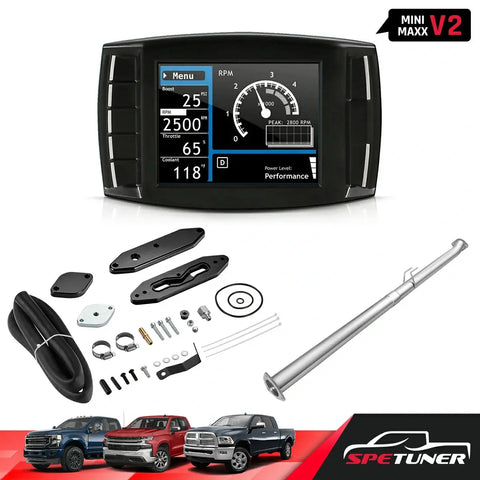Author: Lars - Diesel Performance Expert at SPETUNER
I’m Lars from SPETUNER. We build and tune diesel trucks every day. This guide explains what DPF/EGR do, whether deletes increase power, what gains are typical by platform, how much an off-road-only setup can cost, the risks, and legal alternatives that still deliver real performance.
Legal notice: Removing, disabling, or tampering with emissions equipment is illegal for on-road vehicles in the US and Canada. Information below is for off-road/competition use only where permitted. Always check your local and federal regulations.
At-a-Glance Takeaways
- Deletes can free up ~30–70 HP and ~100–180 lb-ft with proper off-road tuning. Results vary by platform, tune, fuel quality, load, altitude, and supporting mods.
- Expect better throttle response and lower exhaust backpressure; MPG can improve ~5–15% in off-road use.
- Downsides: legal risk (on-road), warranty concerns, higher EGT risk if tuning/monitoring is inadequate.
- For street-legal trucks, consider emissions-intact tuning, high-flow intake/intercooler, and compliant exhaust.
What Are DPF and EGR Systems & Why Do They Limit Performance?
DPF (Diesel Particulate Filter) — The DPF captures soot and fine particles to reduce emissions but creates significant backpressure, limiting engine output and throttle response.
EGR (Exhaust Gas Recirculation) — The EGR system recirculates exhaust into the intake, causing carbon buildup, reduced airflow, higher temps, and clogged intakes. Many off-road drivers use EGR delete kits to restore performance.

How Much Horsepower Can You Gain From DPF and EGR Deletes?
Power Gains: Proper off-road ECU tuning after DPF/EGR removal commonly adds 30–50 HP and major torque improvements, especially under load.
Example: A tuned 6.7L Cummins with deletes and 4" exhaust can jump from 370 HP to 420+ HP, with torque gains of 100+ lb-ft.
For Ford enthusiasts, the potential is just as high. A comprehensive 6.7 Powerstroke delete kit can typically unlock an additional 40–70 HP and massive torque gains, turning a sluggish work truck into a reliable towing machine by eliminating restrictive emissions bottlenecks.

Complete off-road performance package. Includes 4" race pipe, EGR delete hardware, and the necessary tuner to remove all emissions sensors, add +50HP, and fix "Limp Mode" issues permanently.
Fuel Efficiency: Many see a 5–15% MPG improvement due to reduced backpressure and cooler engine operation.

Real-World HP/TQ: Typical Ranges by Platform (off-road/competition only)
Conservative ranges from well-maintained trucks with quality tuning.
| Platform (Years) | Baseline HP | HP After Delete + Tune | HP Gain | Typical TQ Gain |
|---|---|---|---|---|
| 6.7L Power Stroke (2011–2019) | 390–400 | 440–470 | +40–70 | +90–140 lb-ft |
| 6.7L Cummins (2007.5–2018) | 350–370 | 400–450 | +30–60 | +100–150 lb-ft |
| 6.6L Duramax L5P (2017–2024) | 445 | 490–525 | +45–80 | +120–180 lb-ft |
Setup note: Larger 4–5" exhaust, proper fueling/boost tuning, and EGT/boost monitoring are key to hitting these numbers.

Off-Road Cost Breakdown (Typical Ranges)
Actual pricing varies by parts brand, tune complexity, and labor rates.
Off‑road‑use hardware (DPF/EGR/DEF components replaced/blocked): $1,800–$3,800
Custom ECU/TCM tuning (off‑road calibration): $500–$1,200
Turbo‑back exhaust (4–5"): $700–$1,500
Labor (installation & setup): $600–$1,500
Estimated total (off‑road builds): $3,600–$8,000
Budget tip: Never cheap out on tuning or gauges—these protect your engine.
Are DPF and EGR Deletes Legal in the US and Canada?
They are illegal for on-road vehicles. Your truck may fail emissions tests and registration.
Some regions allow deletes for strict off-road/agriculture/competition use. Always check local rules.
Environmental Impact
DPF/EGR systems significantly reduce pollutants. Removing them increases emissions and environmental impact.
On-Road vs Off-Road: Is a Delete Kit Right for You?
Ask yourself:
- Do you tow or haul off-road?
- Is your truck registered for off-road/ag use?
- Can you accept losing your warranty?
✅ Delete kits make sense if you want max performance and aren’t bound by emissions laws.
❌ Avoid deletes if you need to pass emissions tests, retain resale value, or drive in regulated areas.
👉 Instead, explore legal performance mods—like ECU tuning, cold air intake, and high-flow intercoolers—for reliable gains.
Will Deletes Improve Engine Longevity and Reliability?
Benefits:
- Less backpressure = reduced turbo strain
- No EGR = cleaner intake
- Lower exhaust temps = better thermal control
Risks:
- Bad tuning = high EGT and turbo risk
- Possible gasket/turbo failures
- Warranty voided
Key Tip: Always pair your delete kit with professional-grade ECU tuning to protect engine health.

Legal and Reliable Alternatives to DPF & EGR Deletes
ECU Tuning: Improves power and MPG while keeping emissions systems intact.
Performance Parts: High-flow intakes, intercoolers, and exhausts offer legal performance gains.
Explore our Performance Upgrade Kits to find bolt-on power for your diesel truck.

This is the ultimate solution for L5P owners. Includes everything needed for a full off-road overhaul: ECU unlock, TCM tuning, and complete exhaust replacement. Reclaim your engine's reliability and power.
Conclusion
DPF and EGR deletes can unlock significant power and improve reliability, but they come with legal and environmental trade-offs. For off-road use, a properly tuned delete setup offers real performance gains. For street-driven trucks, we recommend ECU tuning and bolt-on upgrades as smarter, compliant alternatives.
Ready to upgrade? Contact SPETUNER or browse our diesel delete kits, ECM tuners, and performance parts.
FAQs
Q1: How much horsepower does a DPF and EGR delete add?
A: On off‑road builds with proper tuning, plan on roughly +30–70 HP and +100–180 lb‑ft, depending on platform and supporting mods.
Q2: Will it improve fuel efficiency?
A: Often ~5–15% in off‑road use thanks to reduced backpressure and optimized calibration. Driving style, terrain, and load still dominate.
Q3: Are DPF and EGR deletes legal?
A: Not for public roads in the US/Canada. Some competition/off‑road contexts allow it. Check federal, state/provincial, and local regulations before modifying.
Q4: Will it void my warranty?
A: Yes—emissions deletes typically lead to warranty denial. If warranty matters, stick to emissions‑intact upgrades.
Q5: What are safer alternatives?
A: Emissions‑intact ECU tuning, high‑flow intake, efficient intercooler/charge‑pipes, and compliant exhaust.
Q6: Is the EGR delete kit worth it for off‑road use?
A: Yes, If legal in your use case and tuned/monitored correctly, it can deliver major gains in drivability and pulling power.
Q7: Will a DPF and EGR delete void my warranty?
A: Yes—same as Q4. Manufacturers generally deny coverage after emissions tampering.
Q8: What risks come with DPF and EGR deletes?
A: Poor calibration can drive EGTs too high, stress the turbo, and harm reliability. There are also legal/inspection risks for on‑road vehicles.
Q9: Are there alternatives to DPF and EGR deletes?
A: Yes—see Q5. These keep emissions equipment intact while improving response and efficiency.
Q10: Is a diesel delete kit worth it for off‑road enthusiasts?
A: For competition/off‑road trucks, a properly tuned setup can be transformative, provided it’s legal in your region.
Q11: Will DPF and EGR deletes affect turbo life?
A: With bad tuning: yes, due to high EGT/drive pressure. With careful tuning and monitoring, reduced backpressure can lower turbo stress.
Q12: Can I pass inspection after a delete with tuning?
A: No. Missing emissions components typically cause inspection failure even with custom calibration.
Q13: What’s the best delete kit combo for horsepower?
A: Off‑road only: DPF + EGR + DEF removal paired with custom ECU/TCM tuning and a 4–5″ exhaust—plus EGT monitoring. Not legal for street use.
Q14: What does a DEF/DPF/EGR full delete cost?
A: As part of a full off‑road package (hardware + tuning + exhaust + labor), the typical cost of full diesel delete budget range is ~$3.6k–$8k, depending on platform and parts.





